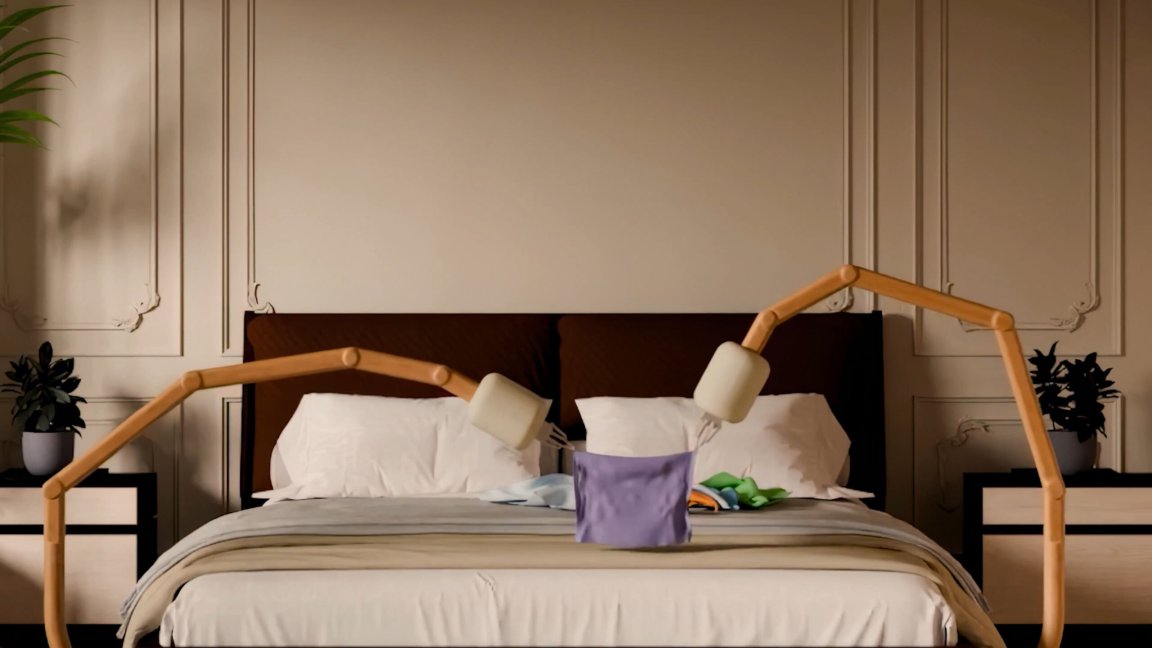
Nothing captures the public imagination quite like an outrageous contraption that promises to do your most annoying chores for you.
Case in point, this week, a video of a laundry-folding robot called “Lume” went viral on X. It’s not a humanoid machine, but a pair of robotic arms that double as two bedside floor lamps — “the first robot designed to blend into your home,” a caption reads. In the video, a woman dumps a bunch of blankets onto her bed, before the light fixture automaton unsheathe their claws and proceed to delicately fold the fabrics. Pretty neat, huh?
“I think you could be the next Tesla if you can actually deliver,” enthused one commenter.
After much suspicion online, it turns out this dextrous display was the work of CGI, according to the robot’s designer Aaron Tan — but he insists there’s a real working physical prototype, even while refusing to show it off quite yet.
“It’s a render, a 3D model that we built to paint a picture of how we think robots can fit into the home,” Tan, a robotics researcher at Stanford, told the San Francisco Standard in a new interview. “It’s made to look aesthetically pleasing.”
In a world obsessed with creating robotic simulacra of the human form, having one impersonate your furniture feels almost charming in comparison. Tan said he was inspired by how household items come alive in the film “Beauty and the Beast.”
“The term I use is ‘ambient robotics,’ where robots sort of work in the background, and you don’t see them, but your chores get done,” Tan told the Standard.
With the Lume, “we wanted it to have a single purpose, and stay out of the way until needed, like a dishwasher,” he added.
The way it’d work is that the Lume would be exclusively controlled by voice commands or an app, doing no more or no less than it’s instructed to do. “It’s not supposed to be sentient. It’s not supposed to be smart,” Tan told the Standard. “It’s not just going to be like, ‘Hmm, I think it’s time I start folding.'”
Again, a sound idea. These are machines, and we should think of them as machines. The rise of “AI Psychosis” among users who come under the spell of a chatbot’s human-like and sycophantic language suggests that anthropomorphizing these things can be bad for our brains.
Plus, as Tan argues, isn’t it kind of weird having a synthetic humanoid in your house, not to mention the major privacy concerns of having something “controlled by some person sitting in a Big Tech office,” Tan said, roaming around where you live?
“We didn’t want the robot to freely roam,” he told the paper. “We don’t want to equip it with super intelligence. It shouldn’t have general knowledge about the world. It should just have knowledge about the task that it needs to do, and for us, it’s laundry folding.”
“We are really just trying to build a tool rather than a human replacement,” Tan finished.
That’s all well and good, but can Tan deliver on his promises, or is this just another piece of shiny vaporware? We don’t want to jump to conclusions, but the best real evidence that we have of this thing in action is a video of two robotic arms flailing under a white sheet, which is more reminiscent of a Scooby-Doo villain’s mechanical ghost than it is of the next frontier in automated laundry-folding miracles.
Astonishingly, that hasn’t stopped thousands of people placing preorders — if Tan is to be believed — which cost $50 to reserve.
“We have a lot of preorders, a lot higher than we were expecting. Like, in the five digits,” Tan said.
Such is the fever around the mere prospect of never having to fold laundry again. It’ll cost you, though: Tan is targeting a “sub-$2,000” price tag, and aims to ship the bots in 2026.
“We are thinking about a potential option where you buy the lamp and laundry folding is a feature upgrade, like Tesla FSD,” Tan said. “Otherwise, it’s a beautiful pair of lamps.”
Okay, never mind. Terrible idea.
More on robots: Band Appears on Stage With Poorly-Disguised Robot Playing the Keytar